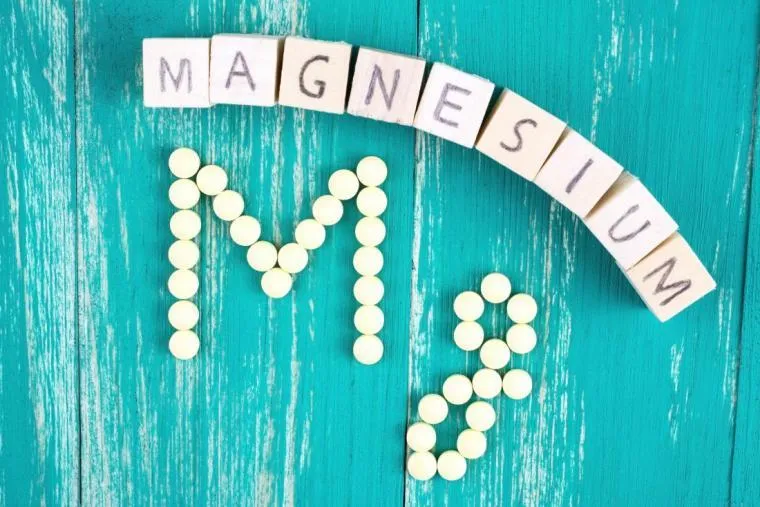THE HOTTEST WELLNESS CONTENT ON THE INTERNET
Click to select an article

Magnesium Glycinate: Unveiling Its Health Benefits and Uses
Magnesium glycinate is a popular supplement known for its potential health benefits. It consists of the mineral magnesium bound to the amino acid glycine. As an essential nutrient, magnesium plays a significant role in various bodily functions, including blood pressure regulation, muscle contractions, and nerve functions. This form of magnesium supplement is widely recognized for its higher absorption rate and gentler effects on the digestive system.
One of the key benefits of magnesium glycinate is its ability to relieve anxiety and promote bone health. Additionally, it has been found effective in managing blood sugar levels in people with diabetes and may lower the risk of developing the condition. Moreover, research has suggested potential benefits in treating hypertension, strokes, and other health conditions. However, it is essential to consult a healthcare professional before incorporating any supplement into daily routines to avoid potential side effects or interactions with other medications.
What Is Magnesium Glycinate
Magnesium glycinate is a dietary supplement that combines magnesium, an essential mineral, with the amino acid glycine. This compound offers several health benefits due to its high bioavailability, meaning it is easily absorbed by the body. In this section, we will discuss the source of magnesium and the role of the amino acid glycine in the formation of magnesium glycinate.
Source of Magnesium
Magnesium is a crucial mineral for a variety of bodily functions, including maintaining proper nerve function, muscle health, and bone strength. It is naturally found in many foods, such as leafy greens, nuts, and whole grains. However, certain individuals may require additional supplementation through magnesium glycinate to achieve optimal magnesium levels, particularly those with magnesium deficiency or difficulty absorbing minerals from food. Magnesium glycinate is preferred over other forms of magnesium supplements, such as magnesium oxide, for its superior absorption rate and reduced side effects. ¹
Amino Acid Glycine
Glycine is a non-essential amino acid, which means the body can produce it on its own, but it can also be obtained through diet. It plays a vital role in protein synthesis and overall metabolic function. When combined with magnesium, the resulting compound, magnesium glycinate, delivers the health benefits of magnesium with a reduced risk of side effects often associated with other forms of magnesium supplements. The presence of glycine enhances magnesium's bioavailability, allowing for better absorption and increased effectiveness in addressing magnesium deficiencies. ²
Benefits and Functions
Bone Health
Magnesium glycinate plays an essential role in maintaining bone health. It helps activate vitamin D, which aids in the balance between calcium and phosphate for bone growth and maintenance. Adequate magnesium intake also supports strong bones and prevents osteoporosis.
Heart Health
Magnesium glycinate contributes to heart health by supporting muscle and nerve function. Low magnesium levels can increase the risk of high blood pressure and heart disease. Furthermore, magnesium assists in maintaining a healthy cardiovascular system by reducing blood pressure and preventing complications such as heart attacks and strokes.
Mood and Sleep
Magnesium glycinate has several benefits related to mood and sleep. It has been shown to relieve anxiety and promote a sense of calmness. Additionally, magnesium plays a vital role in energy production, which can help combat feelings of fatigue and depression. Magnesium glycinate is also known for improving sleep quality by supporting the production of melatonin, a hormone that regulates sleep-wake cycles.
Diabetes Management
Magnesium glycinate plays a role in diabetes management, particularly type 2 diabetes. Consuming high amounts of magnesium in the diet may reduce the risk of developing diabetes. Magnesium helps to break down sugars and might decrease insulin resistance, thereby contributing to better blood sugar control.
Magnesium Deficiency
Symptoms
Magnesium deficiency, also known as hypomagnesemia, can manifest with a variety of symptoms. Some early warning signs of low magnesium levels include fatigue, muscle weakness, cramping, and numbness or tingling sensations. In more severe cases, individuals may experience irregular heartbeat, muscle spasms, seizures, or even behavioral changes such as increased irritability and anxiety1.
Causes
Several factors can contribute to magnesium deficiency in both adults and children. Insufficient intake of magnesium-rich foods, such as leafy green vegetables, whole grains, and nuts, can lead to inadequate levels of this essential mineral2. Other factors that may cause hypomagnesemia include malabsorption issues, such as celiac disease, which can inhibit the body's ability to absorb magnesium from the diet3. On top of that, certain medications, excessive alcohol consumption, and chronic illnesses, such as diabetes, can also lead to low magnesium levels4.
Diagnosis
A doctor can diagnose magnesium deficiency by evaluating the patient's symptoms, medical history, and conducting a blood test to check for low magnesium levels. The test usually measures the amount of magnesium circulating in the blood, with normal ranges typically falling between 1.7 and 2.2 milligrams per deciliter (mg/dL)5. If the blood test results indicate hypomagnesemia, additional tests may be performed to identify and address the underlying cause.
Footnotes
Magnesium Glycinate Supplements
Forms and Dosages
Magnesium glycinate supplements come in various forms, including pills, powder, and capsules. To ensure you are getting the correct dosage, it is essential to follow the manufacturer's guidelines or seek advice from a healthcare professional. Dosage guidelines may differ depending on your age, overall health, and nutritional needs.
Typically, magnesium glycinate supplements are available in these forms:
Capsules: Usually containing 100-200mg of elemental magnesium per capsule.
Powder: Generally providing 200-400mg of elemental magnesium per serving, which can be mixed with water or juice.
Pills: Containing different strengths, ranging from 100-500mg of elemental magnesium per pill.
Bioavailability
An essential aspect to consider when choosing a magnesium supplement is its bioavailability. In other words, how easily the body can absorb and utilize the magnesium. Magnesium glycinate, deemed highly bioavailable, is formed by combining elemental magnesium with the amino acid glycine. This form is easily absorbed in the body, making it an effective choice for those looking to increase their magnesium levels.
Because of its high bioavailability, magnesium glycinate supplements may provide several benefits, such as improving sleep quality, reducing muscle cramps, and supporting overall cardiovascular health. It is crucial to choose a supplement that has a high absorption rate in order to get the best possible results from your magnesium intake.
Side Effects and Interactions
Common Side Effects
Magnesium glycinate is generally well-tolerated, but some people may experience side effects. Common side effects of magnesium glycinate may include nausea, vomiting, diarrhea, and stomach upset. However, magnesium glycinate is less likely to cause these side effects compared to other forms of magnesium supplements due to its enhanced absorption and gentler effect on the digestive system.
It's important to note that excessive intake of magnesium glycinate can lead to an increased risk of side effects such as low blood pressure, irregular heartbeat, and potentially serious complications, especially for those with kidney problems. Symptoms of low magnesium blood levels, such as muscle cramps, tiredness, irritability, and depression should be reported to your healthcare provider.
Drug Interactions
Although magnesium glycinate is a beneficial supplement for many, there are certain medications that may interact with it. Here's a list of some medications that may interact with magnesium glycinate:
Antibiotics: Magnesium glycinate can interfere with the absorption of some antibiotics, such as tetracyclines and fluoroquinolones, reducing their effectiveness. To avoid this interaction, it's recommended to take magnesium glycinate at least 2 hours before or after taking the antibiotic.
Bisphosphonates: These medications are commonly prescribed for osteoporosis. Magnesium glycinate can reduce the absorption of bisphosphonates, potentially decreasing their effectiveness. Separating the intake of magnesium glycinate and bisphosphonates by a few hours is advised.
Diuretics: Some diuretics, especially potassium-sparing ones, can increase magnesium levels in the blood. Taking magnesium glycinate along with these diuretics could potentially lead to high magnesium levels, causing serious side effects. Consult your healthcare provider before combining magnesium glycinate with any diuretics.
It's crucial to inform your healthcare provider of all medications and supplements you're taking to avoid potential interactions. Additionally, always follow the recommended dosage for magnesium glycinate, as excessive intake may increase the risk of side effects and interactions.
Special Considerations
Pregnancy and Breastfeeding
Magnesium glycinate is a magnesium supplement that can be helpful for those with low magnesium levels (source). During pregnancy and breastfeeding, magnesium requirements may increase, as the mother's body needs to support both her own health and the development of her baby. However, it is essential to consult a healthcare provider or pharmacist before taking magnesium glycinate supplements during pregnancy or breastfeeding, as there may be specific recommendations or dosage adjustments needed for individual circumstances.
Kidney Disease
People with kidney disease may have difficulty properly processing and excreting magnesium, leading to an increased risk of magnesium toxicity. Magnesium glycinate supplements should be used with caution and under the guidance of a healthcare provider or pharmacist in individuals with kidney disease (source). It is important to monitor magnesium levels and adjust the dosage as needed to avoid complications related to excessive magnesium intake.
Older Adults
As individuals age, their bodies may become less efficient in absorbing nutrients, including magnesium. Magnesium glycinate can be useful for older adults looking to increase their magnesium intake (source). However, it is vital for older adults to consult a healthcare provider or pharmacist before starting a magnesium glycinate supplement, particularly if they have any pre-existing medical conditions, are taking other medications, or have a history of kidney disease. A healthcare professional can help determine the appropriate dosage and ensure it is safe to use alongside other medications or treatments.
Shopping for sea moss, magnesium glycinate, and other popular supplements?
Click SHOP NOW below to see the best rated products in the market, by OrganicsOcean.com

Featured Article
Who makes the best sea moss product of 2024?
Our researchers compiled months of research so you know what mistakes to avoid when choosing a sea moss product. Click below to read now.
Frequently Asked Questions

Who writes your content?
Our content is written by supplement researchers and nutritional experts using AI models.
Are your articles sponsored?
Most of our articles are written without promotion or advertising intent. However, our top5 supplement reviews are paid for through commissions received from the listed products.
Can I advertise with you?
If you want to advertise your brand, please contact
info@rainmedia.co
© Copyright 2026 Top5-Choices.com by Rain Media. All rights reserved.
This website is owned and operated by the Organics Ocean brand, under Rain Media.
This site and its products and services are not associated or affiliated with, nor endorsed by YouTube, Google, or related entities. They have not been reviewed or backed by YouTube or its affiliates. Causes of ailment or condition vary amongst individuals. It is important that each visitor perform due diligence before purchasing anything recommended by this site, and verify with the manufacturer any claim about the products or services they provide. Results mentioned in testimonials and references are real, but not typical. They are to be used as examples only. This site may contain affiliate links or other forms of compensation. [1] We have a financial relationship with some of our top picks and own the Organics Ocean brand.
*These statements have not been evaluated by the FDA Food & Drug Administration. These products are not intended to diagnose, treat, cure, or prevent any disease.

